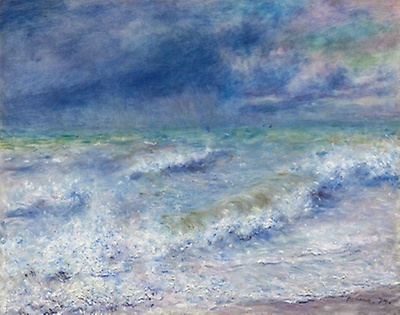Deborah J. Ross's Blog, page 70
March 4, 2019
Citadels of Darkover Author Interview: Evey Brett
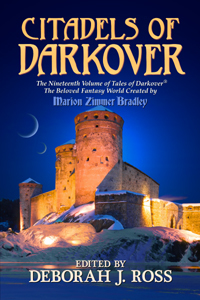 Coming in May 2019Strongholds of rock . . . fortresses of the spirit . . . a planet set apart . . .
Coming in May 2019Strongholds of rock . . . fortresses of the spirit . . . a planet set apart . . .Citadels can be psychic, emotional, and cultural as well as military, and the wonderfully imaginative contributors to this volume have taken the basic idea and spun out stories in different and often unexpected directions.
Pre-order it at:
ePub https://books2read.com/u/4XRR0N
Kindle https://amzn.to/2TmBBW0
Here I chat with contributor Evey Brett:
Deborah J. Ross: How did you become a writer?Evey Brett: I was a music major in college, and toward the end I got to a point where I couldn’t play a whole note without freaking out and needed a creative outlet, one that wasn’t noisy. I’d always liked writing stories and had written several as a kid and teen, so writing stories as an adult came easily enough. I started with some fan fiction and realized I could never sell it, so I started going to the library and picking up books on writing so I could learn to write in an original world. I took some classes at a community college, got accepted into the Clarion writer’s workshop, and my career picked up from there.
DJR: Were there any pivotal moments in your literary journey?EB: There are a few. I went to a very good writer’s program at a community college in San Diego, and was a little stunned when one of the teachers told me my story was good. That gave me the confidence to keep writing. There was going to Clarion, of course, and I believe it was the next summer when WesterCon came to San Diego and I met Deborah J. Ross, and we bonded over Darkover, and I’m so glad I was able to write three stories in a world that meant so much to me.
DJR: Tell us about your introduction to Darkover. EB: Back in 2002 when I was just out of college, I got a job working retail at a now-extinct Foley's department store in a mall. There was a Waldenbooks right across from the store, so I'd often go get a book and settle down in a comfy chair somewhere in the mall to eat my lunch and read. One day I was looking for a new book and picked up The Fall of Neskaya, and I was hooked. Fortunately for me (and the bookstore) they had several other Darkover novels as well.
DJR: What about the world drew you in? EB: I'm a sucker for stories with telepaths and damaged characters. I'd gone through a number of Mercedes Lackey's books, so finding Darkover gave me a whole new world with a sizeable canon to explore. Having just read the back of The Fall of Neskaya, I'd still pick it up to read because it's got everything I want--telepaths, power, gifts, a tormented character with a secret he can't reveal.
DJR: What inspired your story in Citadels of Darkover? How did you balance writing in someone else’s world and being true to your own creative imagination?EB: I don’t remember exactly where the inspiration came from, other than wanting to write a chieri story and having DyanArdais’s dance in Heritage of Hastur stick in my head. As far as writing in someone else’s world, I find that the limitations actually make it easier to construct a story, and I find it kind of fun to work out story details that function within the world. Plus I enjoy research, which means flipping through multiple books and resources to find details I can use—like how chieri have ecstatic dances of their own.
DJR: Is there another Darkover story you would particularly like to write?EB: I’ve wanted to write a chieri story for a while now, and I managed to do it with this one. And since this is the last Darkover anthology, I’m glad my final story is also my favorite one.
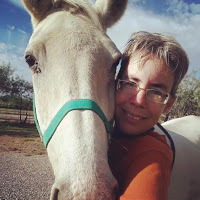 After being ordered (coerced?) to move to southern Arizona by her Lipizzan mare, Carrma, Evey Brett developed a fondness for the local creepy-crawlies such as snakes, scorpions, tarantulas and Gila monsters, not to mention the coyotes, buzzards and hawks that frequent the area. Some of those critters (and/or Carrma) have influenced a number of Evey’s stories, including one in Masques of Darkover and several in Lethe Press anthologies. When not feeding carrots to her equine mistress, Evey can be found shuffling papers for the city or reading submission stories for The Magazine of Fantasy and Science Fiction.
After being ordered (coerced?) to move to southern Arizona by her Lipizzan mare, Carrma, Evey Brett developed a fondness for the local creepy-crawlies such as snakes, scorpions, tarantulas and Gila monsters, not to mention the coyotes, buzzards and hawks that frequent the area. Some of those critters (and/or Carrma) have influenced a number of Evey’s stories, including one in Masques of Darkover and several in Lethe Press anthologies. When not feeding carrots to her equine mistress, Evey can be found shuffling papers for the city or reading submission stories for The Magazine of Fantasy and Science Fiction.
Published on March 04, 2019 08:32
Lace and Blade 5 Author Interview: Lawrence Watt-Evans
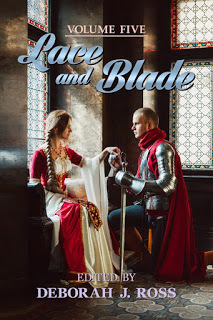 From lands distant or nearby, familiar or utterly strange, historical or imaginary, from ancient times to the Belle Époque comes a treasury of luscious, elegant, romantic fantasy. Come with us on a journey through time and across boundaries, inspired by the longings of the heart and the courage residing in even the meekest person.
From lands distant or nearby, familiar or utterly strange, historical or imaginary, from ancient times to the Belle Époque comes a treasury of luscious, elegant, romantic fantasy. Come with us on a journey through time and across boundaries, inspired by the longings of the heart and the courage residing in even the meekest person.The release date is Valentine's Day 2019, but you can pre-order it now:
Kindle: https://amzn.to/2PBzyj6
Print: here (Amazon) or here (Barnes & Noble)ePub: https://www.books2read.com/u/bwYJwP
Deborah J. Ross: Tell us a little about yourself. How did you come to be a writer?Lawrence Watt-Evans:I became a writer because after a writing assignment my second-grade teacher said I might be one someday, and when I got home that day and told my parents I thought I might like being a writer, it became the only occupation they ever tried to talk me out of pursuing. My parents convinced me that it wasn’t a likely way to make a living, though, so even though I kept writing I figured it would just be a hobby — until my stories started selling, and I couldn’t find a decent day job. I wound up making my living as a writer for thirty-some years.
DJR: What inspired your story in Lace and Blade 5?LWE: I don’t really know what inspired “An Interrupted Betrothal,” exactly. I’d been thinking about how little say women have traditionally had in who they marry, and it grew from that.
DJR: What authors have most influenced your writing? LWE: I’ve been influenced by dozens of authors, from the most famous (e.g., J.R.R. Tolkien) to the most obscure (e.g., C.L. Hales), but the ones who probably contributed the most to my stories for Lace and Blade would include Baroness D’Orczy and Rafael Sabatini.
DJR: What’s the most memorable fan mail you’ve ever received?LEW: Memorable fan mail — there have been a handful of people who wrote to tell me my stories had changed their lives for the better, and it’s hard to forget that. When someone says one of my novels turned him into an avid reader, or even saved him from suicide, all I can do is marvel — I’m just trying to entertain. The people who have sent me drawings of my characters and creations have been delightful, too, if not as overwhelming.On the other hand, there have been at least two loons who wrote to me multiple times. One was trying to convince me of his bizarre theory that Stan Lee was a Nazi, the other wanted to recruit me into a scheme to defraud a couple of publishers. And the one person who sent me fan fiction based on my Ethshar series got so much wrong I felt a little heartsick that he had so completely missed the point of my stories.
DJR: How does your writing process work?LWE: My writing process changes all the time; I can’t really describe it. I write whenever and however I please, which varies from one project to the next.
DJE: What have you written recently? What lies ahead?LWE: These days I’m working on the Tom Derringer series, about a professional young adventurer in a 19th century that isn’t quite the one in the history books. These don’t make a lot of money, but I really enjoy them. I’m writing the third and have plotted up through #6.
DJR: What advice would you give an aspiring writer?What advice would you give an aspiring writer?LWE: My advice to aspiring writers is, don’t listen to advice. Do what works for you. Write the story you want to tell in the way that tells it best; don’t try to please an editor or fit a marketing niche.
DJR: Any thoughts on the Lace and Blade series or this being its final volume?LWE: As for Lace and Blade, I love the premise; must this really be the last?
 Lawrence Watt-Evans, who is inordinately fond of pink flamingos, has been a full-time writer for almost forty years, with fifty novels and well over a hundred short stories to his credit, mostly fantasy, science fiction, and horror. He’s best known for the Hugo-winning short story “How I Left Harry’s All-Night Hamburgers,” the Obsidian Chronicles trilogy, and the ongoing “Legends of Ethshar” fantasy series. As of this writing, he lived in Takoma Park, Maryland, just outside Washington, D.C.
Lawrence Watt-Evans, who is inordinately fond of pink flamingos, has been a full-time writer for almost forty years, with fifty novels and well over a hundred short stories to his credit, mostly fantasy, science fiction, and horror. He’s best known for the Hugo-winning short story “How I Left Harry’s All-Night Hamburgers,” the Obsidian Chronicles trilogy, and the ongoing “Legends of Ethshar” fantasy series. As of this writing, he lived in Takoma Park, Maryland, just outside Washington, D.C.
Published on March 04, 2019 01:00
March 2, 2019
Short Book Reviews: D B Jackson Ventures into Time-Traveling Fantasy
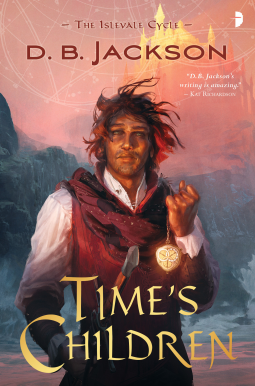 Time's Children, by D B Jackson (Angry Robot)
Time's Children, by D B Jackson (Angry Robot)I loved D B Jackson’s “Thieftaker” Chronicles, set in pre-Revolutionary Boston, with an appealingly flawed hero and a system of magic that extorts a dreadful toll. The plots moved right along, part police procedural, part magical battle, part romance. My interest never wavered, and at the end, I counted many of the characters as friends or at least recognizable enemies I must never trust. So I dove happily into this fantasy with its intriguing premise of magic wielders who can not only cross distances but time itself. I assumed the setting would be vivid, the characters compelling, and the magic itself carefully thought through and integral to the world and the plot.
The description was promising: Fifteen year-old Tobias Doljan, a Walker trained to travel through time, is called to serve at the court of Daerjen. The sovereign, Mearlan IV, wants him to Walk back fourteen years, to prevent a devastating war which will destroy all of Islevale. Even though the journey will double Tobias' age, he agrees. But he arrives to discover Mearlan has already been assassinated, and his court destroyed. The only survivor is the infant princess, Sofya. Still a boy inside his newly adult body, Tobias must find a way to protect the princess from assassins, and build himself a future... in the past.
As I read, I found my expectations were not amiss: the world was complex and interesting, and the characters, particularly the demons, got me curious. I loved the system of magic. An auspicious beginning, I thought. But as page after page went by, each one piling up more secondary characters that seemed to serve no purpose but to be left behind in an unending prequel to the plot promised by the description, I found myself looking around for something else to read. Add to that, the descriptions went on and on…and on, Robert Jordan style. As I’m not a fan of Jordan except as a cure for insomnia, this didn’t work for me.
Don’t get me wrong, D B Jackson is a marvelous writer. The “Thieftaker” books showcase his ability to depict settings with wonderful characters caught up in nonstop action on many different levels, with internal angst as well as external dangers. The prose in Time’s Children is just fine, and often even better than fine. But beautiful writing alone could not, for me, overcome the overlong static passages and the repeated bits of action, interaction, and minor plot threads that seemed to go nowhere.
In the end, I gave up. I’ll wait for the next “Thieftaker” novel or give Jackson’s next a chance…so long as it is not this particular series.
All this said, this is only my own experience and opinion. It’s not that I’m opposed to long novels with leisurely descriptions. I love Tolkien’s writing and re-read The Lord of the Rings at regular intervals. There’s a travelogue in the form of a novel if ever there was one. But the conception of the world and the way it’s imbued with enchantment makes Middle Earth itself the focus for much of the trilogy. That wasn’t my experience with Time’s Children. Perhaps other Tolkien fans – or Jordan fans – will love this series. I wish them joy of it, and D B Jackson himself success with his work.

Published on March 02, 2019 00:59
Short Book Reviews: A Brilliantly Inventive Fantasy Based on Industrial Magic
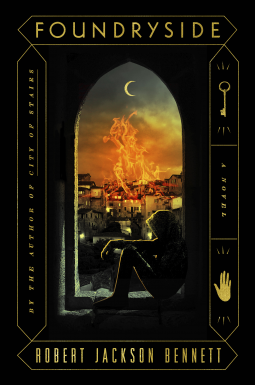 Foundryside, by Robert Jackson Bennett (Crown)
Foundryside, by Robert Jackson Bennett (Crown)I just loved this fantasy adventure, with its compelling heroine and system of “industrialized magic.” The world is an oppressive portrayal of social inequality of the Industrial Revolution. Great families wall themselves up in “campos” and live lives of luxury while the rest of the city suffers pollution and dire poverty. Myths from the past provide tantalizing, terrifying hints of how the entire system of magic came into being.
Young Sancia managed to escape the slave plantations to eke out a living as a thief in the less savory neighborhoods of a great city. She’s able to “listen” to physical materials: “The wall spoke to her. The wall told her of foundry smoke, of hot rains, of creeping moss, of the tiny footfalls of the thousands of ants…” Sancia’s magic aids her in her marginal living, but is dwarfed by the real magic of the city: sigils that are “instructions written upon mindless objects that convinced them to disobey reality in select ways,” such as altering their gravity or adhesion to other objects.
Then Sancia opens a box she has been sent to steal and discovers a sentient key, “Clef,” who can persuade any lock to open, and her world changes forever. She’s not the only one after Clef – her employer will stop at nothing to gain control over the key. But who is her employer and what is that person’s greater plan? Mystery piles on action and personal growth, not only of Sancia herself but other characters. The world and its people are in precarious flux, inwardly and outwardly.
This is not a world in which I would like to live, yet almost from the beginning, I cared about Sancia and the people she encounters, especially Clef, who realizes that he more he uses his power to help his only friend, Sancia, the less of his personality survives. The story built as stakes were raised higher and higher. The magic was an intrinsic part of the world-building, with its own logically consistent rules and its own cost. Highly recommended.
The usual disclaimer: I received a review copy of this book, but no one bribed me to say anything about it. Although chocolates might be nice.

Published on March 02, 2019 00:59
Short Book Reviews: A Jewish Homeland in Kenya
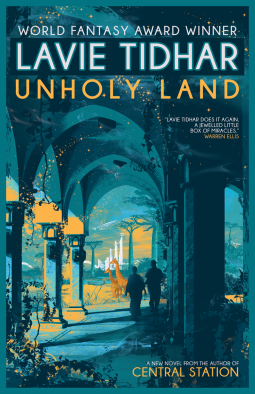 Unholy Land, by Lavie Tidhar (Tachyon)
Unholy Land, by Lavie Tidhar (Tachyon)I never quite settled into this highly praised novel. I really wanted to like it, but found myself reaching for something else to read. The review in Publisher’s Weekly said, “Fantasy Award winner Tidhar (Central Station) will leave readers’ heads spinning with this disorienting and gripping alternate history,” and I think that’s an accurate description of my experience. I could never tell which of many connected alternate worlds I was in, or sometimes which character’s point of view I was in.
On the positive side, I loved the premise: in another world, the Jewish people find a homeland in the early part of the 20th Century, not following the horror of the Holocaust. And not in the Middle East but in Africa, in Kenya. As in modern Israel, where Palestinians are exiled from the lands they have lived in for millennia, Africans are relegated to the other side of the (literal) wall and systematically disenfranchised. I appreciated the evocative parallels between this African Palestina and the modern American immigration debate or Israeli-Palestinian conflict.
Our guide to this world is pulp fiction writer Lior Tirosh, returning home (to Kenyan Palestina) from Germany. At first the story reads like a murder mystery, alternating Lior’s discovery of a body (and so forth) with the first-person narrative of a police officer. However, the initial mystery is quickly superseded by others, eventually centering on the breakdown of the barriers between alternate worlds. That’s a pretty tall order for one book, and I found the switching of worlds and viewpoints (third, first, and even second, which just knocked me out of the story every time) to be confusing rather than intriguing.
Others may find Unholy Land to be a brilliant tour de force, but for me it was frustrating to be repeatedly baffled and to be thrown out of the story line just when things were beginning to make sense.
The usual disclaimer: I received a review copy of this book, but no one bribed me to say anything about it. Although chocolates might be nice.

Published on March 02, 2019 00:59
March 1, 2019
Writer's Round Table: Pros Give Advice on Writer's Block IV
Writer Bobbie Bolig writes poignantly about what it's like to be blocked. I asked some pro writer friends for words of encouragement. Here's my own story:
For much of my early career, I used to joke that I couldn't afford writer's block. I began writing
 Cemetery, New Orleans, 2012professionally when my first child was a baby and I learned to use very small amounts of time. This involved "pre-writing," going over the next scene in my mind (while doing stuff like washing the dishes) until I knew exactly how I wanted it to go. Then when I'd get a few minutes at the typewriter (no home computers yet), I'd write like mad. I always had a backlog of scenes and stories and whole books, screaming at me to be written. The bottleneck was the time in which to work on them.
Cemetery, New Orleans, 2012professionally when my first child was a baby and I learned to use very small amounts of time. This involved "pre-writing," going over the next scene in my mind (while doing stuff like washing the dishes) until I knew exactly how I wanted it to go. Then when I'd get a few minutes at the typewriter (no home computers yet), I'd write like mad. I always had a backlog of scenes and stories and whole books, screaming at me to be written. The bottleneck was the time in which to work on them.
I kept writing through all sorts of life events, some happy, others really awful and traumatic. Like many other writers, I used my work as escape, as solace, as a way of working through difficult situations and complex feelings. I shrouded myself with a sense of invulnerability: I could write my way through anything life threw at me!
Unfortunately, I was wrong.
I hit an immovable wall. My mother had been raped and murdered when my younger daughter was but a wee babe. The DA accepted a plea bargain and so, 9 years later, the perpetrator had his first parole hearing. I put on my psychological armor, marched into San Quentin, and spoke at that hearing. A year later, I found myself in a full-blown post-traumatic crisis. I kept having waking nightmares of both terror and revenge. I couldn't eat, I couldn't sleep, and I couldn't stop crying.
Also, I couldn't write fiction. Stream-of-consciousness journaling helped me get through the darkest days, but the creation of an actual story was beyond me. That creative paralysis added another dimension to the meltdown. If I couldn't write, who was I? Where were my secret worlds, my journeys of spirit and heart where people healed and things got better? Gone...and I didn't know if I'd ever get them back.
I was fortunate to have a lot of help during those dark weeks and months, some of it from fellow writers. No pep talks, just friendship, constant and true. Eventually, I was able to return to fiction writing as well, although by then, I found myself a single working mom and had a new set of demands on my time. I was able to draw on two models for personal writing success – the first being the technique of “pre-writing” (during my lunchtime walks at work) and to use small amounts of time. I carved those out by getting up 10 minutes early, opening a file on my computer, and adding something – if only a couple of words – to the current work. I earmarked part of weekends and holidays for writing time, which worked because that younger daughter was old enough to have her own interests. More than that, however, having recovered this precious part of my life, my writing, gave me the determination to never lose it again. That was essential on those mornings when I’d rather sleep in, or sunny days when the beach was calling. I had to find a new balance in my life, and it was up to me to give writing the priority I wanted it to have.
 Dolomites, by Cleo SandaWriters stop writing for all kinds of reasons. In my case, it was personal and emotional, part of a larger crisis. Other times, however, the well runs dry when the rest of life is going smoothly. Quite a few years ago, I ran into a writer I greatly admired (I think it was at an American Booksellers Association convention way back when my publisher would send various authors, including me), and I'd not seen anything from this writer in quite a few years. I introduced myself and asked when the next book would be coming out. Only when I saw the change in the writer's expression did I realize how difficult the subject was. I was probably the hundredth person that weekend to ask. (Eventually this writer did come out with several new books; I wonder now if the appearance at the ABA wasn't a way of trying to get the head back into writerly-space.)
Dolomites, by Cleo SandaWriters stop writing for all kinds of reasons. In my case, it was personal and emotional, part of a larger crisis. Other times, however, the well runs dry when the rest of life is going smoothly. Quite a few years ago, I ran into a writer I greatly admired (I think it was at an American Booksellers Association convention way back when my publisher would send various authors, including me), and I'd not seen anything from this writer in quite a few years. I introduced myself and asked when the next book would be coming out. Only when I saw the change in the writer's expression did I realize how difficult the subject was. I was probably the hundredth person that weekend to ask. (Eventually this writer did come out with several new books; I wonder now if the appearance at the ABA wasn't a way of trying to get the head back into writerly-space.)
I don't think it's at all helpful to try to "cheer up" a writer in the middle of a dry period. The specific reasons -- creative paralysis, personal crisis, discouragement -- vary so much, I think it's safe to say that each of us has to find our own way through. For me, it's helped immensely to know I'm not the only one to go through it. That's the operational term, to "go through it." To come out the other side. To talk and write about what happened, in the hopes of being the light in the darkness for someone else.
I don’t know what lies ahead for me. Just because there are no thunderclouds on the horizon doesn’t mean unexpected tragedy cannot strike. I know that no matter how strong I am, I can be overwhelmed. However – and this is the big point – I’m the only one who can make me stop writing permanently. I have the ability to recover from no matter what crisis. To build my life, to return to the work I love. So perhaps instead of talking about Writing Through Crisis, I can reframe the concept as Writing Aroundabout Crisis. Remaining true to what’s important to me, knowing it’s waiting for me at the other side of the storm.------------
This essay also appeared as an entry in Janni Lee Simner's Writing for the Long Haul series.
If you'd like to contribute to the discussion, email me at mail@deborahjross dot com.

For much of my early career, I used to joke that I couldn't afford writer's block. I began writing
 Cemetery, New Orleans, 2012professionally when my first child was a baby and I learned to use very small amounts of time. This involved "pre-writing," going over the next scene in my mind (while doing stuff like washing the dishes) until I knew exactly how I wanted it to go. Then when I'd get a few minutes at the typewriter (no home computers yet), I'd write like mad. I always had a backlog of scenes and stories and whole books, screaming at me to be written. The bottleneck was the time in which to work on them.
Cemetery, New Orleans, 2012professionally when my first child was a baby and I learned to use very small amounts of time. This involved "pre-writing," going over the next scene in my mind (while doing stuff like washing the dishes) until I knew exactly how I wanted it to go. Then when I'd get a few minutes at the typewriter (no home computers yet), I'd write like mad. I always had a backlog of scenes and stories and whole books, screaming at me to be written. The bottleneck was the time in which to work on them.I kept writing through all sorts of life events, some happy, others really awful and traumatic. Like many other writers, I used my work as escape, as solace, as a way of working through difficult situations and complex feelings. I shrouded myself with a sense of invulnerability: I could write my way through anything life threw at me!
Unfortunately, I was wrong.
I hit an immovable wall. My mother had been raped and murdered when my younger daughter was but a wee babe. The DA accepted a plea bargain and so, 9 years later, the perpetrator had his first parole hearing. I put on my psychological armor, marched into San Quentin, and spoke at that hearing. A year later, I found myself in a full-blown post-traumatic crisis. I kept having waking nightmares of both terror and revenge. I couldn't eat, I couldn't sleep, and I couldn't stop crying.
Also, I couldn't write fiction. Stream-of-consciousness journaling helped me get through the darkest days, but the creation of an actual story was beyond me. That creative paralysis added another dimension to the meltdown. If I couldn't write, who was I? Where were my secret worlds, my journeys of spirit and heart where people healed and things got better? Gone...and I didn't know if I'd ever get them back.
I was fortunate to have a lot of help during those dark weeks and months, some of it from fellow writers. No pep talks, just friendship, constant and true. Eventually, I was able to return to fiction writing as well, although by then, I found myself a single working mom and had a new set of demands on my time. I was able to draw on two models for personal writing success – the first being the technique of “pre-writing” (during my lunchtime walks at work) and to use small amounts of time. I carved those out by getting up 10 minutes early, opening a file on my computer, and adding something – if only a couple of words – to the current work. I earmarked part of weekends and holidays for writing time, which worked because that younger daughter was old enough to have her own interests. More than that, however, having recovered this precious part of my life, my writing, gave me the determination to never lose it again. That was essential on those mornings when I’d rather sleep in, or sunny days when the beach was calling. I had to find a new balance in my life, and it was up to me to give writing the priority I wanted it to have.
 Dolomites, by Cleo SandaWriters stop writing for all kinds of reasons. In my case, it was personal and emotional, part of a larger crisis. Other times, however, the well runs dry when the rest of life is going smoothly. Quite a few years ago, I ran into a writer I greatly admired (I think it was at an American Booksellers Association convention way back when my publisher would send various authors, including me), and I'd not seen anything from this writer in quite a few years. I introduced myself and asked when the next book would be coming out. Only when I saw the change in the writer's expression did I realize how difficult the subject was. I was probably the hundredth person that weekend to ask. (Eventually this writer did come out with several new books; I wonder now if the appearance at the ABA wasn't a way of trying to get the head back into writerly-space.)
Dolomites, by Cleo SandaWriters stop writing for all kinds of reasons. In my case, it was personal and emotional, part of a larger crisis. Other times, however, the well runs dry when the rest of life is going smoothly. Quite a few years ago, I ran into a writer I greatly admired (I think it was at an American Booksellers Association convention way back when my publisher would send various authors, including me), and I'd not seen anything from this writer in quite a few years. I introduced myself and asked when the next book would be coming out. Only when I saw the change in the writer's expression did I realize how difficult the subject was. I was probably the hundredth person that weekend to ask. (Eventually this writer did come out with several new books; I wonder now if the appearance at the ABA wasn't a way of trying to get the head back into writerly-space.)I don't think it's at all helpful to try to "cheer up" a writer in the middle of a dry period. The specific reasons -- creative paralysis, personal crisis, discouragement -- vary so much, I think it's safe to say that each of us has to find our own way through. For me, it's helped immensely to know I'm not the only one to go through it. That's the operational term, to "go through it." To come out the other side. To talk and write about what happened, in the hopes of being the light in the darkness for someone else.
I don’t know what lies ahead for me. Just because there are no thunderclouds on the horizon doesn’t mean unexpected tragedy cannot strike. I know that no matter how strong I am, I can be overwhelmed. However – and this is the big point – I’m the only one who can make me stop writing permanently. I have the ability to recover from no matter what crisis. To build my life, to return to the work I love. So perhaps instead of talking about Writing Through Crisis, I can reframe the concept as Writing Aroundabout Crisis. Remaining true to what’s important to me, knowing it’s waiting for me at the other side of the storm.------------
This essay also appeared as an entry in Janni Lee Simner's Writing for the Long Haul series.
If you'd like to contribute to the discussion, email me at mail@deborahjross dot com.

Published on March 01, 2019 01:00
February 27, 2019
Today's Moment of Art
Published on February 27, 2019 01:00
February 25, 2019
Lace and Blade 5 Author Interview: Doranna Durgin
 From lands distant or nearby, familiar or utterly strange, historical or imaginary, from ancient times to the Belle Époque comes a treasury of luscious, elegant, romantic fantasy. Come with us on a journey through time and across boundaries, inspired by the longings of the heart and the courage residing in even the meekest person.
From lands distant or nearby, familiar or utterly strange, historical or imaginary, from ancient times to the Belle Époque comes a treasury of luscious, elegant, romantic fantasy. Come with us on a journey through time and across boundaries, inspired by the longings of the heart and the courage residing in even the meekest person.The release date is Valentine's Day 2019, but you can pre-order it now:
Kindle: https://amzn.to/2PBzyj6
ePub: https://www.books2read.com/u/bwYJwP
A lifelong horse lover, I fell in love with Doranna Durgin's early novel, Dun Lady's Jess and have been a fan ever since. So I was particularly delighted to edit her stories for Lace and Blade 4 and 5.
Deborah J. Ross: Tell us a little about yourself. How did you come to be a writer?Doranna Durgin: I was always a writer. I think I started in at the typewriter in early grade school, writing horse stories that didn’t know where to go with themselves. I finally wrote (and illustrated and bound!) my first complete book when I was twelve, and never stopped writing from that point.
DJR: What inspired your story in Lace and Blade 5?DD: I wanted to do something new—not based in a previous world, but something intense and complete unto itself. I woke up one morning thinking, “Clockwork Unicorn.” So the story grew from there. Why was it clockwork? Why was that element important? How would the story center around it? And what did the story want to say?So rather than being inspired, it was more a matter of making space for what wanted to grow.
DJR: What authors have most influenced your writing? DD: More than anything? Will James, who wrote a whole lot more than Smoky. Ernest Haycox. A spate of men’s adventure books that I got into when I was too young to be reading them. We’re talking grade school and middle school here. In high school, Anne McCaffery & Katherine Kurtz made an impression that carried forward, mixed up with some Mary Stewart and some of the early SF masters. In my mid-20s I found now-friend Jennifer Roberson’s books, and those made an impact. At that point, I think, I started to develop enough of my own self that although I continued to find authors I adore, they weren’t as influential in what I was doing.
 DJR: How does your writing process work?DD: I don’t actually know. I mean, I used to know, and then a certain element of NY publishing chewed me up and spat me out in pieces, and now I’m slowly re-inventing myself. The only thing I know for sure is that it can’t be like it was before. At the moment, because the traditional production phases became so grim and destructive, I find that second draft (my former favorite part) is now too overwhelming in anything but small pieces, so I’m doing first and second draft pretty much at the same time. It feels entirely alien, but my first new novel since my muse imploded is finally building itself so I’m gonna go with it.
DJR: How does your writing process work?DD: I don’t actually know. I mean, I used to know, and then a certain element of NY publishing chewed me up and spat me out in pieces, and now I’m slowly re-inventing myself. The only thing I know for sure is that it can’t be like it was before. At the moment, because the traditional production phases became so grim and destructive, I find that second draft (my former favorite part) is now too overwhelming in anything but small pieces, so I’m doing first and second draft pretty much at the same time. It feels entirely alien, but my first new novel since my muse imploded is finally building itself so I’m gonna go with it.DJR: What have you written recently? What lies ahead?DD: I’m mostly working on a sequel to Wolverine’s Daughter. I’ve got more planned for that series, but also have a contemporary, gritty, slightly alternate world shapeshifter trilogy in development—a very Southwest approach to the matter. There’s no dearth of ideas in the project list. I’m just putting myself back into gear as I can, without any real notion whether the new stuff will be independently or traditionally presented.
DJR: What advice would you give an aspiring writer?DD: To investigate the market options thoroughly, decide what will complete you as a writerand then take the steps on that specific path. There are a lot of decisions to make that go beyond learning the craft, and they aren’t all interchangeable.
DJR: Any thoughts on the Lace and Blade series or this being its final volume?DD: Whut! I didn’t even know! Totally bummed. I’ve only participated in two volumes, and I’ve found them wonderful opportunities to stretch my writing mind—circumstances that do, I think, make for the best of story collections.Totally bummed.
 Doranna Durgin is an award-winning author (the Compton Crook for Best First SF/F/H novel) whose quirky spirit has led to an extensive publishing journey across genres, publishers, and publishing lines. Beyond that, she hangs around outside her Southwest mountain home with horse and accomplished competition dogs. She doesn't believe in mastering the beast within, but in channeling its power--for good or bad has yet to be decided! She says, “My books are SF/F, mystery, paranormal romance, & romantic suspense. My world is the Southwest, and my dogs are Beagles!” She's best known for the Changespell Saga, and her most recent book completed the Reckoners trilogy.
Doranna Durgin is an award-winning author (the Compton Crook for Best First SF/F/H novel) whose quirky spirit has led to an extensive publishing journey across genres, publishers, and publishing lines. Beyond that, she hangs around outside her Southwest mountain home with horse and accomplished competition dogs. She doesn't believe in mastering the beast within, but in channeling its power--for good or bad has yet to be decided! She says, “My books are SF/F, mystery, paranormal romance, & romantic suspense. My world is the Southwest, and my dogs are Beagles!” She's best known for the Changespell Saga, and her most recent book completed the Reckoners trilogy. 
Published on February 25, 2019 01:00
February 22, 2019
Writer's Round Table: Pros Give Advice on Writer's Block III
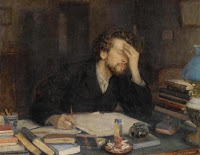 Writer Bobbie Bolig writes poignantly about what it's like to be blocked. I asked some pro writer friends for words of encouragement.
Writer Bobbie Bolig writes poignantly about what it's like to be blocked. I asked some pro writer friends for words of encouragement."Overcoming Writer's Block"By Barb Caffrey
When writer and editor Deborah J. Ross asked me about how I'd overcome writer's block for an upcoming column series at her blog, I wasn't sure what I'd write—though I did tell her that of course I'd write something. Because, you see, I've had to overcome writer's block several times over the years, with the first time being due to my husband's unexpected death fourteen years ago. I know that tragedy, illness, family health problems, work-related issues, and other things can creep into your subconscious, and make it nearly impossible to write anything at all.
And yet, we're creative people, we writers. We need our creativity, or we don't function very well. We expect to be able to write, even when we feel terrible; even when our husband just died; even when our mother just broke her leg in three places; even when our workload is so high, we can barely turn around from doing the work and falling into bed, repeating ad nauseum.
Is this fair to expect this of ourselves? No, of course not. But as I said, we expect to be able to write no matter what.
There are reasons for this, of course. There are folks out there who put up such a good front in the professional writing community that you'd think nothing fazes them. (Granted, they may not have ever run into the situations I have, you have, or someone else you know as a writer who's dealing with tragedy, long-term illness of their own or in their family, or some other deep and frustrating concern.) They'll tell you that the death of their mother didn't stop them, so why can't youwrite? They'll tell you that they once worked seventy-five-hour weeks, came home and took care of young children, and woke up at four a.m. every day to write for an hour or two before they had to start breakfast for the kids and get off to work.
I believe that is possible, that sometimes people can—for a short time—overcome such difficulties and write. And it certainly is possible even with high-hour weeks to schedule in your writing time; I've done it, most writers I know have done it, and while it doesn't always feel great because you want to do more and can only manage a few hours here and there, it's a lot better than nothing.
But those outliers who actually can do such superhuman things and then pass them off as normal are detrimental to the rest of us. We aren't superhuman. We're people. We're fallible. We're mortal. And we only have so many hours in the day, with a sharply limited and finite energy supply to give.
What can we, the fallible, mortal writers who aren't outliers, do to keep writing under such difficult situations?
For me, what has helped the most over time is to try not to be so hyper-critical of myself. I get to the point, after being tired, sick, stressed, bereaved, Goddess-knows-what, that I am afraid to write because I'm afraid I'll make no sense at all. (And yes, I'll admit to my fears in this matter, because if I don't, I will never get anything done.) If I write something, anything, I'm going to call that a win.
The second thing I've learned, and have counseled other people about also, is this: What we think, as tired, stressed, sick, bereaved, Goddess-knows-what individuals, about our writing may not be accurate. For example, a good friend of mine last night told me he had thrown out 2500 words because he felt they were terrible in the moment, and he didn't want to wait until tomorrow or the next day to look at 'em again and decide whether he could keep them, whether they were better than he thought, whether there was anything to what he'd written that was salvageable.
I told him, trying not to be stern as I think about him as a younger brother, that he needed to try to reinstate that file. He had to get it back, if possible. Those words were almost certainly not as bad as he thought, and were not a waste of time by any means! I also told him about writer Anne Lamott's struggles with her own award-winning writing, related in BIRD BY BIRD. While my paraphrase won't be as good as Ms. Lamott's own words, here it is: you write the first draft, knowing it will be execrable. Then you take whatever you can from that, and keep going, polishing, adding, and refining, until you get to the golden nuggets of story within that you need.
I think if someone as distinguished as Anne Lamott can admit that her own first efforts are terrible, we all should realize that we can't start with a perfect product every time. (Not that writing is a product, but that is a blog item for another time, perhaps.)
I like to think of it this way: We have to think about what we're going to say, yes, but we also have to trust that we can say it. What we need to do is to have faith in ourselves that our writing—no matter how halting it's become, no matter how stressful it's become to get any words on the page, no matter how frustrating it can be to overcome all these different problems to do what we're born to do—still matters.
If we can admit that it still matters to us, and if we can tell ourselves that no matter how long it's been since we last were able to make any sense on the page, we can keep writing.
So, my best advice is this: Be good to yourself. Don't beat yourself up. Heed the words of Anne Lamott. And keep trying, no matter how long it takes…don't let anyone stop you from writing, even if sometimes you have to set it aside due to major life crises. You can and will get back to it just as soon as possible, and all the crises you've had will make you a better, deeper, and more informed writer with better stories to tell.
I firmly believe this. And I hope you will, too.
Barb Caffrey has written three novels, An Elfy On The Loose (2014), A Little Elfy in Big Trouble (2015), and Changing Faces (forthcoming), and is the co-writer of the Adventures of Joey Maverick series (with late husband Michael B. Caffrey) Previous stories and poems have appeared in Stars Of Darkover, First Contact Café, How Beer Saved The World, Bearing North, And Bedlam's Edge (with Michael B. Caffrey).
If you'd like to contribute to the discussion, email me at mail@deborahjross dot com.

Published on February 22, 2019 01:00
February 21, 2019
Kitten Hooligans
The kittens are now about 5 months old and have turned into a couple of hooligans. Most of the pics I took turned out blurred because they're moving so fast. Nonstop wrestling, then falling over, then more wrestling alternating with getting into whatever mischief they can... They are well matched. Although Freya (dilute torbie) is about 6 weeks younger, she's bigger and heavier. Sonja may end up bigger, but had a rougher start in life. It's unusual for a red/orange kitty to be a girl, but she is.






Published on February 21, 2019 01:00

